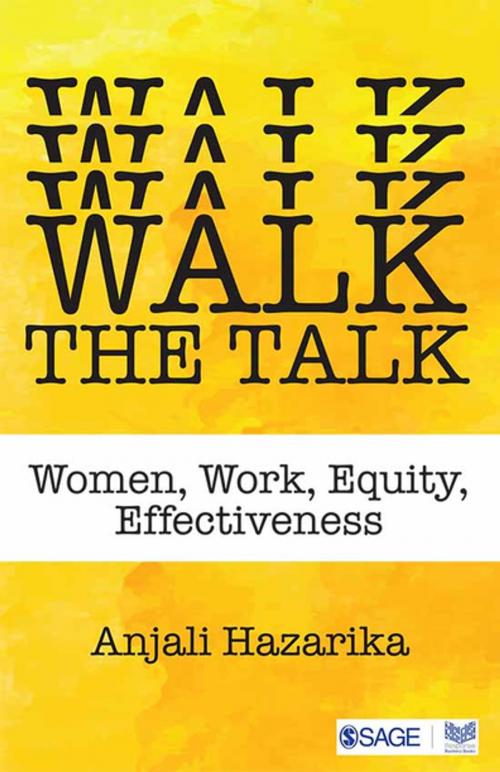Walk the Talk
Women, Work, Equity, Effectiveness
Business & Finance, Management & Leadership, Management| Author: | Anjali Hazarika | ISBN: | 9789386446930 |
| Publisher: | SAGE Publications | Publication: | August 28, 2017 |
| Imprint: | Sage Publications Pvt. Ltd | Language: | English |
| Author: | Anjali Hazarika |
| ISBN: | 9789386446930 |
| Publisher: | SAGE Publications |
| Publication: | August 28, 2017 |
| Imprint: | Sage Publications Pvt. Ltd |
| Language: | English |
**2nd prize in the DMA-NTPC Management Book Awards, 2018.
Shortlisted for Management Book of the Year Awards 2019 by Chartered Management Institute, UK.**
If we recognize that economic growth requires the efficient allocation of resources, then how can half of the world’s population be prevented from making a full contribution?
We acknowledge that women are different, yet fail to realize their potential as equals. We accept that women need to be empowered, yet debate who should take the lead and who the stakeholders are.
This book grows directly out of the personal challenges the author grappled with, the conversations she has had with women in a variety of settings, and the constructive debates with corporate representatives and policy planners on how the process of change should be initiated. It asserts that the responsibility of enhancing gender diversity at the workplace does not lie entirely with the companies, although much work needs to be done by them, but with several stakeholders—the government, NGOs, men, and women themselves—all of whom need to work together to bring about an equitable environment for women at the workplace. When these stakeholders operate in isolation they are less effective; they add greater value when networked.
This book is a must-read for those who would like to walk the talk and suggests how together we can ensure equity with effectiveness. It provides ideas and agenda for action to create an ecosystem of empowerment.
**2nd prize in the DMA-NTPC Management Book Awards, 2018.
Shortlisted for Management Book of the Year Awards 2019 by Chartered Management Institute, UK.**
If we recognize that economic growth requires the efficient allocation of resources, then how can half of the world’s population be prevented from making a full contribution?
We acknowledge that women are different, yet fail to realize their potential as equals. We accept that women need to be empowered, yet debate who should take the lead and who the stakeholders are.
This book grows directly out of the personal challenges the author grappled with, the conversations she has had with women in a variety of settings, and the constructive debates with corporate representatives and policy planners on how the process of change should be initiated. It asserts that the responsibility of enhancing gender diversity at the workplace does not lie entirely with the companies, although much work needs to be done by them, but with several stakeholders—the government, NGOs, men, and women themselves—all of whom need to work together to bring about an equitable environment for women at the workplace. When these stakeholders operate in isolation they are less effective; they add greater value when networked.
This book is a must-read for those who would like to walk the talk and suggests how together we can ensure equity with effectiveness. It provides ideas and agenda for action to create an ecosystem of empowerment.















